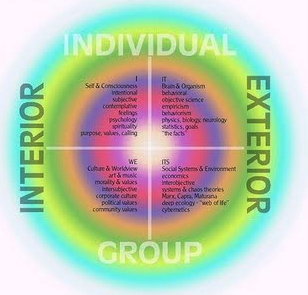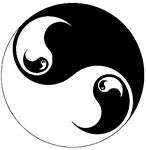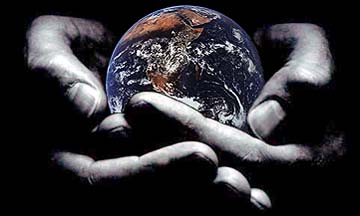Warren Kinston
22. September 2012 18:00
Aware living is what humanity's future must be about. The alternative is to live like a robot, to operate under orders, to be a slave to an ideology.

One the hardest things to be aware about are paradoxes. It can be tricky to be constructive when handling opposites that are simultaneously true. These show up in the Taxonomy as «dualities», and they rank with hierarchies as the most important primary structure within the THEE. In starting to review these systematically, I ran into an issue that I want to share.
It is about the difference between my experience-based approach and Ken Wilber's philosophical approach, called Integral Theory.
Ken Wilber started writing about levels of consciousness, but soon added to this a quadrant structure based on two universal opposites (dualities): interior v exterior, and individual v collective. However, you should note that these are conceptual distinctions. In Wilber's own words, he is providing a theory of consciousness. It's such a big theory, and so unfalsifiable, that it is a philosophy. It can be argued about—if you have that sort of ability.
By contrast, the taxonomy that I call THEE, is not a theory at all. Aware living relates to your own experiences—this includes your ideas but it has nothing to do with conceptual sophistication. Aware living is about More...
About
Warren Kinston
Warren Kinston
8. April 2012 11:00

«Egoism and altruism» is a hardy perennial of philosophers and now a staple for academic psychologists. Are people basically self-interested or basically concerned for others?
Trick question. Once the issue is posed like this, any hope of understanding oneself or acting sensibly is lost.
People act in their own self-interest. They must. Some are certainly more self-centred than others. People are also capable of concern for others and demonstrate benevolence. They must. Otherwise it would be hard to live in groups. Again, there is variation amongst people in the degree of altruism. For some of you, it might be hard to live with yourself if you were irredeemably selfish.
The issue is never what academics or philosophers assert people 'are'—and which, supposedly, is what you are or what I am. The issue in real life is always about what am I going to do at this moment in this situation given who I am. The variations here are almost infinite.
Yes, we do have tendencies and styles. But we are not More...
About
Warren Kinston
Warren Kinston
22. March 2012 08:00

If you can help with WILLINGNESS, you will simultaneously help me in my struggle to grasp CHANGE. Both are intrinsic to pursuing our endeavours.
I explained in my last blog how I try to get things progressively clearer.
A crucial feature is ensuring the pattern is right: which means that other elements in the system work well. I call this structural corroboration.
So right now, I want help for something in Personal Endeavour that may be so approximate that it is wrong and misleading. Understanding Endeavour depends on properly appreciating the seven Root Levels that constitute it and define it fully. Of these, CHANGE has proved to be the toughest nut to crack. I'm depending on work in other areas to provide more clues before I launch an assault on its bastions.More...
About
Warren Kinston
Warren Kinston
29. February 2012 09:30
 One of the ideas of the website, was that the essential work of being critical of formulations and properties could be partly taken up by others—by at least a few, perhaps tens, even hundreds of others. However, I now realize that the Internet doesn’t work that way. Creativity, we are told again and again, depends on not criticizing ideas. Common politeness respects personal autonomy and demands restraint—there is something in that.
One of the ideas of the website, was that the essential work of being critical of formulations and properties could be partly taken up by others—by at least a few, perhaps tens, even hundreds of others. However, I now realize that the Internet doesn’t work that way. Creativity, we are told again and again, depends on not criticizing ideas. Common politeness respects personal autonomy and demands restraint—there is something in that.
But, oh dear, does that mean the evolution of ideas based on competitive battles, necessarily red in tooth and claw, must give way to consensus on the lowest common denominator of expedience, fashion or what feels good? Not really. It just means that I have to be my own biggest enemy. So I am playing the role of hitman today on More...
About
Warren Kinston
Warren Kinston
19. February 2012 16:00

Life is not about what you believe, it is about what you do. And doing thrives on optimism, with some hope as the sauce. It chokes on pessimism marinated in cynicism and doubt.
These thoughts come from the latest posting on creativity. The topic is still in the forefront of my mind because I am working on the two postings for March. These are about what More...
About
Warren Kinston